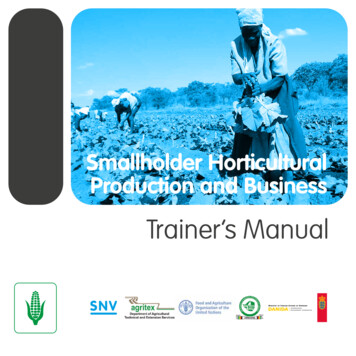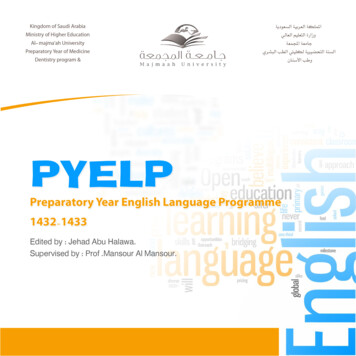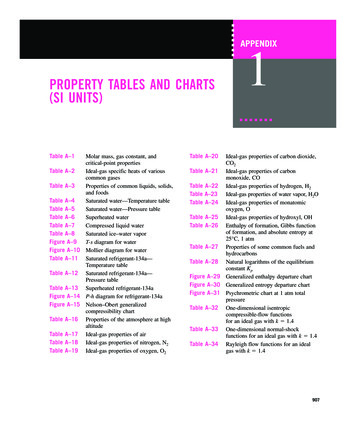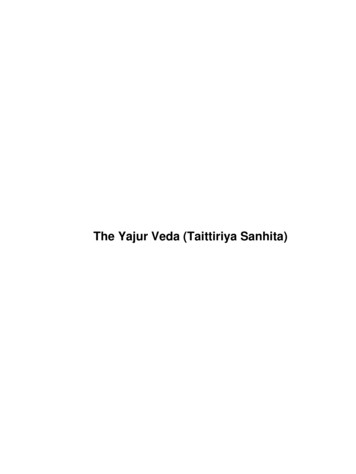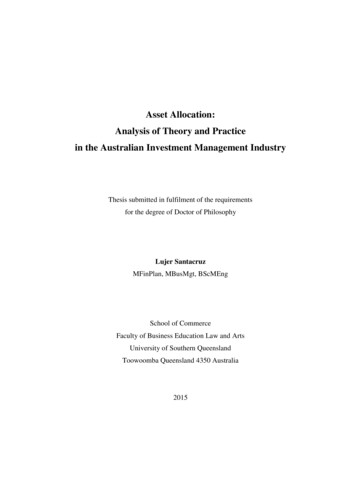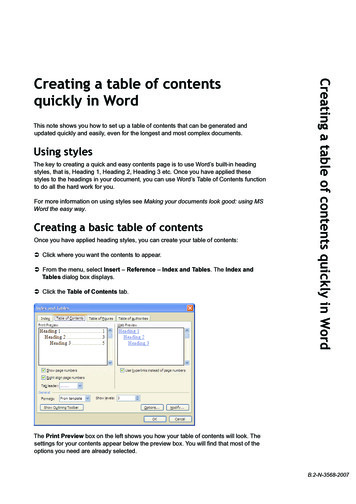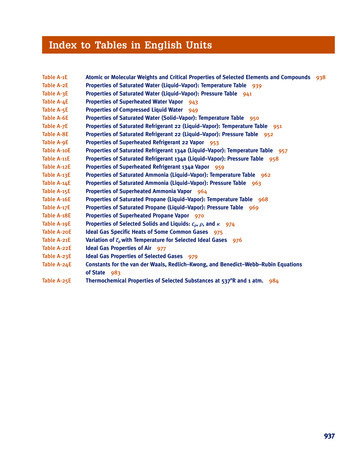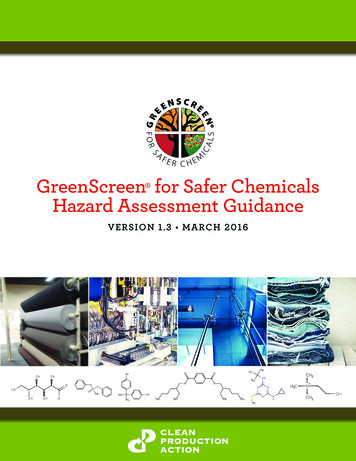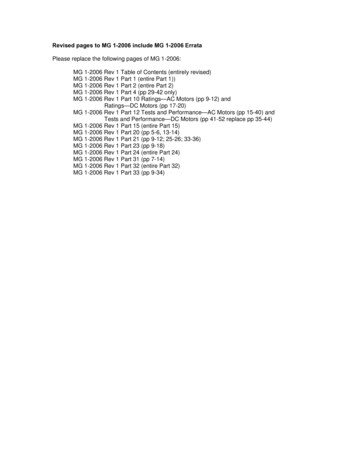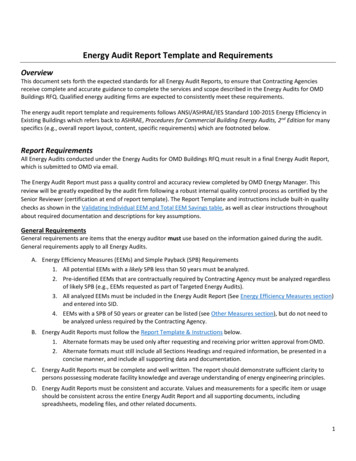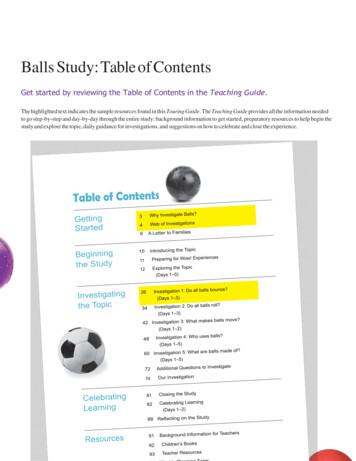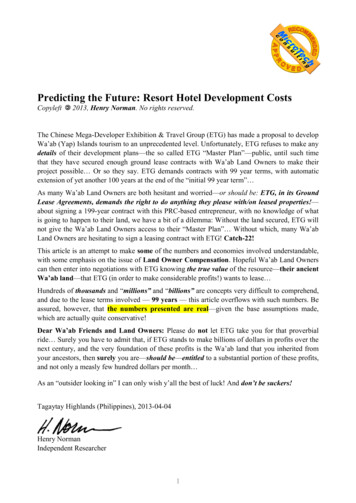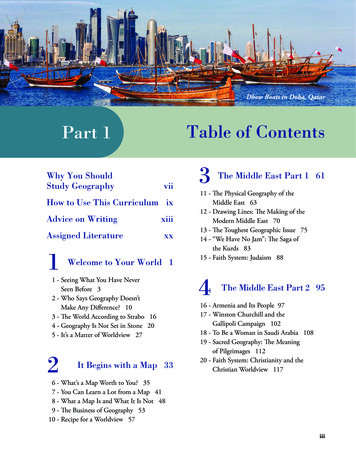
Transcription
Dhow Boats in Doha, QatarTable of ContentsPart 1Why You ShouldStudy Geography viiHow to Use This Curriculum ixAdvice on Writing Assigned Literature 1xiiixxWelcome to Your World 11 - Seeing What You Have NeverSeen Before 32 - Who Says Geography Doesn’tMake Any Difference? 103 - The World According to Strabo 164 - Geography Is Not Set in Stone 205 - It’s a Matter of Worldview 272It Begins with a Map 333The Middle East Part 1 6111 - The Physical Geography of theMiddle East 6312 - Drawing Lines: The Making of theModern Middle East 7013 - The Toughest Geographic Issue 7514 - “We Have No Jam”: The Saga ofthe Kurds 8315 - Faith System: Judaism 884The Middle East Part 2 9516 - Armenia and Its People 9717 - Winston Churchill and theGallipoli Campaign 10218 - To Be a Woman in Saudi Arabia 10819 - Sacred Geography: The Meaningof Pilgrimages 11220 - Faith System: Christianity and theChristian Worldview 1176 - What’s a Map Worth to You? 357 - You Can Learn a Lot from a Map 418 - What a Map Is and What It Is Not 489 - The Business of Geography 5310 - Recipe for a Worldview 57iii
ivTable of Contents5North Africa 12321 - Of Jasmine and Spring: The Story ofTunisia 12522 - A Man and a Canal 13123 - The Berbers 13824 - The North Africa Campaign inWorld War II 14425 - Faith System: Islam 1496West Africa 15726 - Cocoa Growing in Côte d’Ivoire 15927 - Riches and Poverty in Mali 16328 - The Trees of Lzake Volta 16829 - The Music of Nigeria 17230 - Faith System: Folk Religion 1787Central Africa 18331 - Life in a Refugee Camp 18532 - The Mbuti: A ThreatenedWay of Life 18933 - Cameroon: Legacy of Colonialism 19434 - Beautiful and Deadly: Ebolain the DRC 19935 - Kent Brantly, Physicianand Missionary 2038East Africa 20736 - Hope Instead of Hate in Rwanda 20937 - William and His Windmill 21438 - Give Water, Give Hope, Give Lifein Kenya 21939 - Long Distance Runnersfrom Ethiopia 22440 - Where Did You Get That Worldview ofYours? 230Drummers in Accra, Ghana
Fortress of Guaita on Monte Titano in San MarinoTable of Contents9vSouthern Africa 23541 - They Say a Diamond Is Forever 23742 - This Is Our Land: The Story ofthe Zulus 24243 - Roll the Gospel Chariot Along 24744 - Can People Once EnemiesGet Along? 25145 - Truth 25710Southern Europe 26346 - The Basques: One People in TwoCountries 26547 - What’s In a Name? The Saga ofNorth Macedonia 27048 - You Go Here and You Go There 27449 - Microstates: Vestiges of Earlier Times 28150 - Paul’s Sermon onHuman Geography 28911Western Europe 29551 - Not a Fairy Tale 29752 - The Flower That Made the NetherlandsFamous 30153 - When Weather HelpedMake History 30754 - Helping a ContinentBe Strong and Free 31255 - Faith 31912Northern Europe 32356 - Living on the Edge: The Samiof Finland 32557 - Is This What Tomorrow Looks Like? 33058 - They Do Things Their Way:The Faroe Islands 33459 - Surveying the Matter: The StruveGeodetic Arc 33860 - The Existence of God 342
viTable of Contents13Eastern Europe 34761 - The Jews of Eastern Europe 34962 - Defiant Hungarians 35763 - The Vltava (The Moldau) 36464 - A War They Didn’t Want: Ukraine 36865 - The Nature of God 3741415The Arctic andThe Antarctic 40571 - To the North Pole and UNDER 40772 - Sitting on Top of the World 41373 - A Homeland for the Inuit 41774 - Endurance 42175 - “Have You Entered the Storehousesof the Snow?” 427Russia 37966 - The Bear: Russia 38167 - Snapshots from the Urals 38768 - The Deepest Lake in the World 39169 - The Toughest Project 39570 - Creation vs. Evolution 400Ivolginsky Datsan, Buddhist Templein Buryatia, RussiaSources S-1Credits C-1
Mo Chu River, Punakha, BhutanPart 216South Asia 43176 - Trouble and Hope in Afghanistan 43377 - A Fertile Field in the Mountainsof Nepal 43878 - The Siddis of India 44379 - “Because It’s There” 44780 - God’s Worldview 45117Central Asia 45581 - The Case of the Disappearing Sea 45782 - Kazakhstan: Who Are They? 46183 - Of Bread and Poverty: Tajikistan 46584 - Turkic, Turkmenistan, and the Turks 46985 - The Environment 473Table of Contents18East Asia 47786 - One China, Two Chinas 47987 - A People Divided for Decades:Korea 48588 - Rice-Growing: It Has to BeJust Right 49189 - More Than a Cup of Tea 49590 - Faith System: Meditative Religions 50119China 50791 - The People of China 50992 - People Who Don’t Fit 51393 - China’s Belt and Road Initiative 51894 - Malcom McLean and the Box 52495 - Faith System: Atheism 529Church of St. Alexander Nevsky (Russian Orthodox)Tashkent, Uzbekistaniii
ivTable of ContentsKosrae, Federated States of Micronesia20Southeast Asia 53596 - Troubled Waters: The South China Sea 53797 - In the Middle: The Philippines 54498 - More Than Just a Place: Vietnam 55099 - A Nation Defined by Water:Indonesia 555100 - The Worldview of Jesus 56121Australia andNew Zealand 567101 - Kia Ora, Aotearoa(Greetings, New Zealand) 569102 - A City Named Sydney 576103 - Wonders of the Australian Outback 582104 - In the Waters Near Australia 587105 - John Mann, Scientist 593Lucky Bay, Western Australia
Table of Contents22vThe Pacific Ocean andIts Islands 597106 - John Harrison’s Clock 599107 - Papua New Guinea and Melanesia 605108 - Guam and Micronesia 610109 - Not Quite Perfect: Polynesia 615110 - “Let the Many Islands Be Glad” 62023North America Part 1 625111 - There Is One:The Northwest Passage 627112 - Pierre Boucher’s Canada 632113 - Not Always Easy: New Orleans 638114 - America’s Amazing Waterways 644115 - Joseph Murray, Surgeonand Researcher 64924North America Part 2 653116 - American Landscape Art 655117 - A Place in the Sun: Babcock Ranch,Florida 661118 - Together and Apart: The Diomedes 665119 - Little House on Geography 669120 - Geography in the Bible 67625Central America 683121 - The Mixture That Is Mexico 685122 - Rosewood in Guatemala 690123 - Ecotourism in Costa Rica 695124 - Belize: A Small Country with BigDiversity 700125 - How the World AffectsYour Worldview 70426The Caribbean 709126 - The Blue Economy of the Caribbean 711127 - He Does It to Save Lives 716128 - How Sweet It Is—And Wasn’t 722129 - So Close: Cuba 727130 - Changing Your Worldview 733
viTable of Contents27South America Part 1 739131 - The Rubber Soldiers of the Amazon 741132 - Gauchos of the Pampas 748133 - Living on Lake Titicaca 753134 - “The Sea Belongs to Us by Right” 758135 - Evangelism in the Global South 76328South America Part 2 769136 - “The Cascade from the Sky”:Angel Falls 771137 - Fighting Over the Little Sisters 775138 - The Longest Line on the Map 779139 - The Welsh at the Bottomof the World 785140 - What Is the Meaning and Purposeof Life? 78929The People of the World 793141 - All These People! 795142 - Population Changes, Too 803143 - City Mouse, Country Mouse 810144 - Who Owns the Land? 817145 - Peopleview – How We See Ourselves andOthers 82430World Geographyand You 829146 - How Do You Say It? 831147 - How Do You Get There? 838148 - What’s Bigger Than a Nation But SmallerThan the World? 843149 - Globalism and Nationalism 848150 - Only Jesus Can Make theWorld One 855Sources S-1Credits C-1Salisbury Plain, South Georgia Island
Oculus Station House, New YorkWhy You ShouldStudy GeographyImagine going into a large room that is filledwith people who are engaged in several differentconversations.Over here, two people really seem to beconnecting deeply with each other. In that corner,two other people are in a heated discussion and seemready to come to blows. Four people in the middleare working together to set up some sort of display.Over there, a small group is looking at pictures onsomeone’s phone; and the people involved reallyseem to be enjoying themselves.But you’ve just arrived, and you have no ideawhat people are talking about or what they aredoing. You think, “If I only knew what is going onhere, I’d feel more comfortable. Maybe I could evenhelp or contribute something to a conversation.”So you move around the room, listen to people,and ask some questions. Slowly you get an idea of thedifferent interactions that are taking place. As youget to know people better, you can offer somethingto some of those conversations. Now that you knowwhat the group setting something up is doing, youoffer to help with that project.This description of entering a large room issomething like what you are going to be doing in afew years. You are going to enter a big room calledthe adult world. Lots of things are going on there.Some folks get along well, while others have cometo blows. Some are developing a project together,but others don’t know each other and perhaps don’teven speak to each other. If you can understand whythings are the way they are in our world, you will bebetter able to make a positive difference in it.Helping you better understand our world is thepurpose of Exploring World Geography. Traditionally,geography deals with such topics as what is a volcano,how much of the world is covered with water, andthe definitions of a desert and plate tectonics. Thosesubjects are elements of physical geography, and youneed to understand those subjects to understand thephysical world that God made. However, the modernfield of geography has expanded to include manyelements of human life on this planet, especiallyas it relates to geography or geographic place. Forinstance, you can study population geography,cultural geography, political geography, economicgeography, rural and urban geography, and, in thiscourse, human geography.This course deals with two main questions:(1) How has the physical world made a differencein what people have done, how they have lived, andhow they live today? (2) How have people made adifference in the physical world, and how are theymaking a difference in it today?vii
viiiJournalist and geography writer Robert Kaplansays that geography is the backdrop to human history.Geography is where we live, and it impacts how welive. Geography affects all of us. Some people denythis. They say that geography is only incidental tohuman interaction. Moreover, with the invention offaster travel and instant worldwide communication,some people say that geography doesn’t really matteranymore.Try telling a soldier who has fought on the desertmountains of Afghanistan that geography doesn’tmatter. Explain how cotton became king in thepre-Civil War American South without referring togeography. Describe the role of New York City as aninternational trade and immigration center withoutreferring to its geographic location. Understand themodern Middle East without referring to oil or theexistence of Israel. Discuss the immigration issuewithout referring to a geographic setting. Whenyou look into these and many other issues regardinglife on this planet, you will find that geography doesmatter.Every person can make a profound differencein the lives of others by how they respond to theirsetting and to the opportunities that God places intheir path—a path that runs through geography. Ourworld—especially the part of it where you live—iswhere God has placed you. You might wish that youlived in a place with greater natural beauty or withmore opportunities for economic advancement,but He has placed you in the location where youare. If you move to another place or region, in thatnew setting you will find other opportunities andlimitations that geography will influence.The task of living effectively as an adult is beforeyou; serve God by fulfilling that task where you are.We hope that we encourage you to take geographyseriously. Be assured of this: if we as Americans do nottake geography seriously, other people—includingsome who have decided to be our enemies—willtake it seriously; and that will affect us negatively.A few key factors help to explain why historyand current events have happened the way theyExploring World Geographyhave. The most important is God. The second mostimportant are the decisions and actions that peoplemake. We might also cite family, cultural influences,and religious beliefs. In this mix of factors, one keyfactor is geography.We hope that this curriculum will help youunderstand better this fascinating world in which welive. We hope you will think, “Oh, that’s why thiscountry has done this or that” or “It’s amazing howthat mountain range affects that region.” Knowingsomething about the geographic settings in whichpeople live will give you empathy. Knowing inspiringstories will encourage you in your own life. Learningwhat God teaches us about our world helps us live init. Learning the power of the gospel that offers hopeand truth to every tribe and tongue and people andnation will help you redeem the time that you have.Geography has relevance to current affairs. Inthe time that we worked on this curriculum, theruler of Swaziland changed that country’s name toEswatini. The country once known as Macedoniachanged its name to the Republic of NorthMacedonia. Wildfires devastated the geography ofAustralia. China’s Belt and Road Initiative, whichmany countries accepted eagerly its early stages, haschanged shape and encountered opposition fromsome countries. Huge demonstrations in HongKong protested the way China was governing thatcity. As we were finishing the development of thecurriculum, the COVID-19 pandemic swept theworld. As you move into adult life, you will need toremain informed and discerning about the issues inwhich geography plays a part.Our goal is to inspire you to think broadly andto act boldly, to see your own setting in time andplace as an opportunity for growth and adventureor as an obstacle to overcome. We hope that youwill envision what God might do through you asHe has done through countless others who havelived in their own times and places. Preparing youto live successfully in that big room called the adultworld is what we have tried to do in the lessons, thereadings, the literature, and the assignments.
Lake Wanaka, New ZealandHow to UseThis CurriculumAs you both, parent and student, plan yourstudy using this curriculum, here are someideas to help you get the most out of it.This curriculum provides one year’s credit inthree subjects: geography, English (literature andcomposition), and worldview. The 150 lessons aredivided into thirty units of five lessons each. Eachunit has four lessons on geography, and a final lessonon worldview.Since a typical school year has thirty-six weeks,you have some flexibility in completing the course.The student can take two weeks to complete a unitif they find a topic particularly interesting or whenyour schedule is especially busy. Families are free tochoose how they want to schedule the course, butmany families choose to begin a unit on Mondayand finish it on Friday.On the first day of a unit, read the unitintroduction. Here you will find a brief overviewof the unit; a list of lessons for that unit; a Biblepassage to memorize; a list of books used with thatunit; choices for a project for that unit; and, whena literature title is begun, an introduction to thatbook.After reading the introduction, choose a projectto complete by the end of the unit and make aschedule for how to complete it. Find the memorywork for the week in the Bible translation ofyour choice.Complete the following each day: Read the lesson for the day. Complete all of the Gazetteer, geography,worldview, and literature assignments forthe lesson. If you are using the optional Student Review,complete the assignment(s) for that lesson. Work on your Bible memorization and onyour chosen project.On the last day of each unit, the student willrecite or write the memory work and complete theproject for the unit.The curriculum includes the Exploring WorldGeography Gazetteer. This volume contains maps ofthe continents and regions we discuss in the text, asection on each country of the world, and originalsource material that we assign once per unit. TheAssignments section at the end of each day’s lessonincludes the Gazetteer assignment when appropriate.You will need to plan carefully what the studentdoes each day. For instance, every fifth day includesix
xreading the worldview lesson and answering thereview questions, finishing the project for the unit,writing or reciting the memory verse for that unit,and taking the geography quiz for that unit.In twelve of the units the student will alsoneed to finish the literature title they have beenreading, answer the review questions on it, andread the literary analysis for that book. In six units,the student will also need to take the geography,English, and worldview exams over the previous fiveunits. Plus, the student will need to study for all ofthese exams.Instead of waiting until the last day of a unitto complete all of these assignments, students canspread out the work load and make it easier tocomplete. For example, students can complete theirunit project on Day 4 of the unit. She might alsowant to plan her reading so that she finishes theliterature title on Day 4 of the unit and completesthe review questions and literary analysis that day.We have provided the tools for your study of thesesubjects. How you complete the curriculum isultimately up to your family determining what is thebest approach for you to take.An assignment checklist is available as a freedownload on our website (notgrass.com/ewglinks).Worldview LessonsIn the assignments for several of the lessons in eachunit are thought questions regarding worldview. Werecommend that the student have a Bible notebook(wire-bound or 3-ring binder) in which she copieseach question and writes a response to the question.Alternatively, the parent may choose to have thestudent read the question aloud and give an answerorally. However, writing down the questions andanswers will probably help the student rememberthe questions and answers better.As part of our worldview survey, we look atseveral religious systems that people practice in theworld besides Christianity. We look at these otherfaith systems from the perspective of outsiders.How to Use This CurriculumWe have never been part of these groups, and theinformation we share is the result of our researchon these subjects. Those who adhere to thesefaith systems might see inaccuracies or misplacedemphases in our treatment of them. It is not ourpurpose to misrepresent these faiths or to createstraw men that we can easily knock down in anattempt to show the superiority of Christianity.We have attempted to refrain from usingdemeaning language or from saying anything like,“We can’t believe that intelligent people believethese ridiculous ideas, but apparently they do.” Wewant to show respect for the people who hold thesebeliefs, even as we express our disagreement withthese beliefs and why we believe that Christianityis true. We are not ashamed of the gospel, and wewant to keep the door open for civil discussionswith those of other faiths in the hope that we canencourage everyone in the pursuit of truth.Map Skills AssignmentsA map skills assignment comes at the end of onelesson in most units, usually on the fourth day ofthe unit. Their purpose is to help the student betterunderstand and utilize maps. The lessons in Unit 2have a good deal of information about maps, so themap skills assignments begin in Unit 3.We recommend that the student create a mapskills notebook or folder for these activities.Tips on Bible MemorizationEach unit of Exploring World Geography gives aBible passage to memorize. Here are some tips onmemorization for the student. Pay attention andinternalize what the verses mean. It will be mucheasier to memorize thoughts that you understandthan to see them as a string of words that have nomeaning to you. Write the verses on index cards.Keep these handy to use when you have a sparemoment. Copying out the verses is a good exercise,especially if you learn visually.
How to Use This CurriculumDraw pictures illustrating the verses. Ask anotherperson to read the verses to you. Ask another personto listen to you and correct your recitation. Workingon memorization consistently in small chunks oftime over several days works much better than lastminute cramming.Unit ProjectsEach unit (except Unit 3) has three choices fora project, always including a writing assignment.Parents can decide how many writing assignmentsthe student must complete to fulfill the Englishcredit of Exploring World Geography. We recommendthat you choose the writing assignment as the projecta minimum of six times throughout the course.The other project choices include a wide varietyof activities: building models, cooking, field trips,volunteer opportunities, and more, all of which willenhance and expand what the student is learning inthe course.The projects relate to the material in the unit.Where applicable, we note the lesson from whichthe project is drawn. The student should choose aproject at the beginning of the unit and work onit throughout the unit. The student may need tolook ahead at the relevant section of the lesson to getstarted on the project.As you choose projects unit by unit, take theopportunity for the student to try new things andexpand her skills. If she has never made a model outof STYROFOAM , or seldom done any cooking,or doesn’t know how to make a video, this isa great opportunity!The student should complete each project at ahigh school level. Some of these assignments couldbe given to an elementary school student and theresults would be on an elementary school level.The student should complete the work with careand research and attention to accuracy, creativity,and excellence. Throwing something together in ahaphazard fashion is not appropriate. Whether thestudent spends his time writing an essay or buildingxia model, he should use his mind and hands to createsomething he can be proud of.Student Review PackThe Student Review Pack includes three booksto help the parent and student measure the student’sprogress through the course and understanding ofthe material: the Student Review Book, the Quiz andExam Book, and the Guide for Parents and AnswerKey. Using these books is optional, but you willlikely find them useful.The Student Review Book contains reviewquestions on each lesson, review questions on someof the source documents in the Gazetteer, reviewquestions and analysis of the literature, and a mapskills assignment for most units.The Quiz and Exam Book has: a geography quiz for each unit that coversthe first four lessons of that unit and isdrawn from the lesson review questions forthose four lessons, a geography exam covering every five unitsthat is drawn from the quizzes for thoseunits, an English exam covering the literary analysisand questions for the books read every fiveunits, and a worldview exam every five units coveringthe review questions for the five worldviewlessons in those units.How We Present ScriptureThe most important material in this course arethe studies from God’s Word. Understanding worldgeography and literature is important, but how welive before God is the most important issue beforeeach one of us. We want to help you as you do that.
How to Use This CurriculumxiiWe believe in the inspiration and authority ofthe Bible, and our desire is to present the Bible inall of its truth, wisdom, and power. We strive in allwe do simply to be Christians. We are on a quest tounderstand the truth that God has provided in HisWord.If you read something in this curriculum thatdiffers from what your family believes, take theopportunity to discuss the issue and search theScriptures together. We welcome your feedback. Ifyou believe that we have written something in error,please email us so that we can learn together thetruth that will set us free.Notes on the LiteratureWe chose works of literature that illustrategeography in various places around the world. Asthe student reads the books, she should take specialnote of geographic features such as lakes, rivers,mountains, the region of the world, the cultureof the people, and how these features fit into thestory. The setting of a work of literature is a place ingeography, so the study of geography and the studyof literature will enhance each other.Worldview also plays a part in the study ofliterature. As the student reads each work, he shouldnotice the worldview of the characters; clues to theworldview of the author; and how the book supports,informs, or challenges his worldview. Thus the studyof literature and the study of worldview will enhanceand support each other.AppreciationI am indebted to all those who have helped withthis project. My wife, Charlene, wrote the lessonabout her ancestor, Pierre Boucher of Boucherville,Quebec, Canada. She proofread the curriculumwith me and provided invaluable input in manyother ways. Our son John collected illustrationsand laid out the pages, lessons, and units. Ourdaughter Bethany helped to develop the originalplan for the curriculum, selected the literature toinclude, and wrote most of the literary analysisand the literature review questions. Our daughterMary Evelyn designed the covers and proofread thecurriculum. I also want to thank Dena Russell andDavid Shelton for their vital assistance in developingthis curriculum and Sean Killen for producing thebeautiful maps in the Gazetteer.Exploring World Geography completes the cycle ofNotgrass high school social studies curriculum thatincludes Exploring World History, Exploring America,Exploring Government, and Exploring Economics.This series began with the publication of ExploringAmerica in 2002. What a joyful ride it has been.I will forever be grateful for the thousands ofstudents who have used these materials and for thecountless words of appreciation we have received.May the Lord receive all the praise. Thank you andthank Him.Ray NotgrassGainesboro, TennesseeDecember 2020ray@notgrass.com
Chinese Typewriter (1970s)Advice on WritingComposition is part of most high schoolEnglish courses. It usually involves learninghow to express ideas, write themes, anddo research papers. Practicing writing helps you todevelop your style and skill, just as practicing anyactivity will help you to be better at it. I make myliving by writing, so I appreciate the importance ofthis skill.One goal of high school composition is toprepare you for college composition. I have taughtcollege students who never learned to construct agood sentence, let alone a good paragraph. However,learning to write just for high school and collegecomposition assignments is a limited goal. Life doesexist beyond school.You will probably have many occasions to engagein research and to prepare your thoughts on a vitalsubject such as abortion or capital punishment. Youwill have numerous opportunities to write: lettersto friends and family, journals, letters to the editor,social media posts, advertisements for your business,and reviews and articles for periodicals, to mentionjust a few. The Internet has created new possibilitiesfor sharing your ideas in written form. Desktoppublishing has made getting a book publishedwithin the reach of many people who might not geta contract from a big-name publisher.Writing helps you express what you understandabout a subject. If you can’t explain something toanother person, you probably don’t understand itwell yourself. The writing assignments in this coursewill help you learn to pull your thoughts together.Good writing style is important in getting yourideas across to other people. Writing skills will behelpful in your job or in conducting your ownbusiness. You will bless your spouse and children ifyou write thoughtful letters to them often. You canhelp others by expressing yourself well in writing.Three ways to improve your writing are to readgood writing, to write often yourself, and to receivecriticism of your writing with humility and a desireto do better. Reading and applying the guidance ingood books on writing will also help you refine yourtechnique. I recommend The Elements of Style byWilliam Strunk Jr. and E. B. White.Writing Assignments inThis CourseEach week you do a writing assignment (insteadof one of the other suggested projects), you willhave two or three possible topics from which tochoose. Some of the essay prompts refer to topicsthat one of the lessons in the unit discusses.xiii
xivA basic way to compose an essay is to writefive paragraphs: an opening paragraph that statesyour purpose, three paragraphs that developthree different points or arguments, and a closingparagraph that summarizes your position or topic.If you are floundering on a particular assignment,using this outline can get you started.The usual target length of your writing projectsfor this course is 250 to 300 words, which is abouttwo typed, double-spaced pages.Writing Tips to ImplementHere are some tips I have learned that havehelped my writing.Write with passion. Believe in what you aresaying. People have plenty to read, so give themsomething that will grip them. If you don’t believedeeply in what you are saying, you give others noreason to do so either. This raises an issue that relatesto many writing assignments. Assigned writing islike assigned reading: we often approach it as achore. Deep emotion and a passion for convincingothers may be difficult to express in a theme on“The American Interstate System” or “The InternalHierachy of International Organizations.”Writing with passion means that you should notsoft-pedal what you say. Phrases such as “It seemsto me,” “I think that it would be good if,” or “Mypersonal opinion, for what it is worth,” take the fireout of your message. It is your piece, so we knowit is your opinion. Just state it. Related to this isthe common use of quotation marks to highlighta word. Save quotation marks for when you areactually quoting something.Develop your paper in an orderly and logical way.Using an outline helps me to structure what I amwriting. Identify the major points you want tomake, the order in which you need to make them,and what secondary points you want to includeto support your major points. Be sure that eachparagraph has one main point, expressed in a topicsentence, with the other
physical world that God made. However, the modern field of geography has expanded to include many elements of human life on this planet, especially as it relates to geography or geographic place. For instance, you can study population geography, cultural geography, political geography, economic geography, rural and urban geography, and, in this
